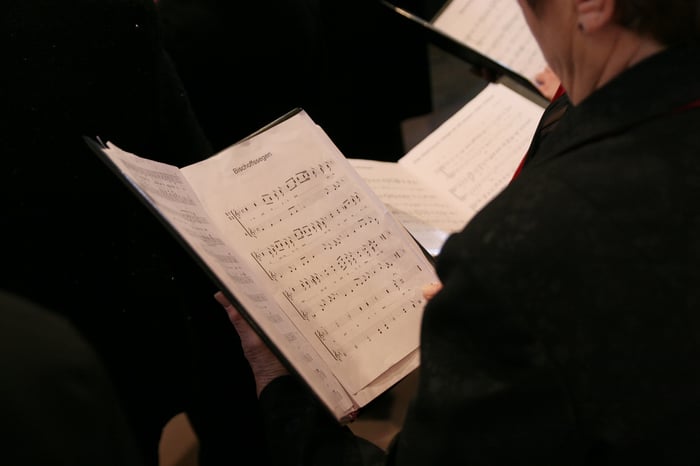
I'm a choir director, not a copyright lawyer. The extent of my copyright knowledge is somewhere between I know copyright exists and that I should probably pay attention to it. But I'll be honest... copyright has always felt so overwhelming that I never really took the time to learn the ins and outs of it.
This past year my choir grew exponentially and we are now starting to plan public performances, so I decided it was time to get serious. And it turns out, with the help of the right advisor, learning about copyright wasn't so bad after all.
My Copyright Advisor
Kelly Beard is the Executive Manager of Susquehanna Valley Chorale and she really knows copyright laws. Not only does she work with them on a professional level with her chorale, but she is also involved with copyright at home. Her husband has worked with lawyers for copyright laws, infringement, and protection, representing many artists. Her daughter is a singer-songwriter and her son is an up-and-coming YouTube sensation. Together, they discuss copyright laws and how they apply to the individual artist. Kelly graciously offered her time to be interviewed on all of my copyright questions. Her first piece of advice: sign up for an ASCAP account and get your "public performance" license.
Obtaining Your ASCAP Public Performance License in 4 Simple Steps
ASCAP is a performing rights organization and, according to Kelly, will also be your go-to resource for everything copyright-related. They have an online chat feature, an email, and office number where you can reach them during office hours to answer any copyright question you've ever dreamed of. But more importantly, they will provide you with the appropriate licensing you need to avoid copyright infringements. In these four steps, you will find out if ASCAP is the right fit for you, sign up for an online account, determine your licensing needs, and pay your fees. Note: in some cases, a performance venue will be responsible for obtaining the required licensing. There may also be a situation where both parties - the choir and the venue - are jointly responsible.
Step 1: Search Your Repertoire on ASCAP's Website
The first step is making sure that ASCAP does actually cover the type of repertoire you perform. ASCAP has a repertory library that can be used to search your repertoire for the upcoming concert season. The library has everything from popular musicians in the media to contemporary composers of large works. Note: there may be instances where a piece requires licensing from multiple organizations such as BMI or SESAC.
Step 2: Sign Up for an ASCAP Account
Once you have confirmed that ASCAP will cover the rights to perform your music, you will then want to create an account for yourself. (This took me 1 minute to complete!) An ASCAP representative will contact you to discuss further.
Step 3: Determine the Appropriate Copyright License(s) Needed
The types of licenses you need will vary based on your choir. However, almost every performing choir will need a "Public Performance or Performance Rights." Separate licenses are also available for sound recording rights, radio and television broadcasting rights, rights for performing dramatic/nondramatic works, and more.
Step 4: Run Your Quarterly Report on Performances and Pay Fees
Every quarter, you will need to complete a report of your performances and pay your dues. Reports are due on January 15, April 15, July 15, and October 15 (15 days after the end of each quarter). The fees you pay are a small percentage (ranging from .10%-.80%) of your gross ticket revenue and are determined based on the seating capacity of your venue as shown in this report. You will need to know your venue's seating capacity and total gross revenue for the performance in order to complete. Free and benefit concerts are a separate but nominal fee. Want to save paper? You can also complete the form online after logging in to your account.
With your performance license in place, you can rest easy on stage!

Copyright Questions Answered
Outside of the performances, there were other copyright concerns I had which Kelly happily addressed!
Can I post videos of my choir rehearsing and/or performing on YouTube or other social channels?
There is no clear-cut answer for this. Her advice is to do your research on ASCAP's site as well as the social channel's copyright guidelines before posting.
YouTube's "fair use guidelines" covers the instances for which you can use copyrighted material without worry of infringement. If your videos are non-commercial (you are not making profit) and/or the video is used for educational purposes, it is much more likely to be considered fair use than commercial use.
But be aware, if the owner of the copyright finds your post and can prove that its usage does not fall under the "fair use guidelines," they may ask YouTube to give you a copyright strike and take down that specific video. Be very careful - if you receive three copyright strikes, your account will be terminated and all videos to your account will be removed.
Check out the copyright pages on these social channels to learn more: YouTube, Facebook, Twitter, and Instagram. Every situation is unique, therefore it is a good idea to contact the music publisher and copyright owner for the appropriate permissions/licensing needed before posting.
Can I perform and post choral pieces within the public domain without obtaining licenses?
Yes, but it is your responsibility to ensure that the piece you are performing is in the public domain. Cornell's public domain page provides a comprehensive list of copyright terms to help you identify when/which pieces fall into public domain. It was most recently updated in January 2017.
Can we record our performances and make CDs/digital recordings for our choir members' benefit only?
First, ask yourself these questions:
- Is my organization making any money off of distributing these recordings?
- Did someone else make profit from recording the performance?
If the answer to those two questions is no, then you may be ok to proceed with your recordings under fair use guidelines. If you charge for the recordings in order to offset any required production costs, that may also be okay if no individual or organization is making profit. As stated above, if your recording is non-commercial in nature, it is much more likely to be considered fair use than commercial use. If you are making a profit or the recording does not fall under fair use, you will need to obtain the a mechanical license and/or synchronization license for recording and distributing.
What if I purchase the appropriate amount of sheet music for every member of my choir, but everyone wants a separate copy for their musical notes... is it okay to make copies?
As long as you have paid for the appropriate number of copies for your choir to learn the music, then the music publishers will likely not chase you down if you photocopy for the sake of score marking/educational purposes. Music publishers are more likely to file a suit if you have not purchased the appropriate number of original pieces for every musician in your ensemble. Still, you should contact the music publisher for written permission; it's easy and they will likely give you the written permission you need so you won't have to worry.
Tips for Success
Kelly had some additional tips for copyright success!
- Keep an archive of every concert - date, venue, tickets sold, seating capacity, etc. for record-keeping purposes.
- Giving credit to the copyright owner does not mean that you are protected from copyright infringement. You still will need the appropriate permissions and licensing to perform or post music.
- Steer on the side of caution and be smart. Do your research before performing any music publicly, making any recordings, or posting online. The last thing you want is to face a copyright lawsuit and deal with the legal fees of the case!
- When in doubt, ask someone! You are not alone in this. Every choir director has to deal with copyright. Use the resources below to locate a copyright expert and get your questions answered.
Additional Resources
- BMI - a performing rights organization similar to ASCAP
- Chorus America
- YouTube Copyright Guidelines
- "The 6 Legal Rights of Copyright Holders as Explained by Abbie Betinis"
- NAfME
If you have additional questions, Kelly Beard is available to help. You can reach her at svchorale@gmail.com.
This article is written for the purpose of a discussion around music copyright. It is not intended as use for legal advice. This article was updated on March 9, 2017 for the purposes of including additional clarifying statements.

Kelly Beard is the Executive Manager of the Susquehanna Valley Chorale (SVC) in Lewisburg, PA. The SVC was founded in 1969 and currently consists of well over 100 auditioned members from a wide geographical area. The chorale has been led by several distinguished conductors and has emerged as the leading ambassador of the arts in the Central Susquehanna Valley.
Beard auditioned for the SVC in January of 2007 and was a regular singing member, volunteering her time to marketing for the group in audience development. In 2010 the position opened for a new executive manager and Beard was encouraged to apply by her singing peers. Since then, she may not have as much time to sing, but she says the fulfillment of bringing great choral works to enthusiastic audiences makes it worth every minute.
Beard resides in central Pennsylvania with her husband, a renowned fantasy artist, a daughter who also sings with the chorale - when not traveling the country performing, a son who is an up-and-coming YouTube celebrity and their dog Simon, whose only job is to make everyone happy.

Tori Cook is the former Director of Sales & Marketing at Chorus Connection, an active board member of the Greater Boston Choral Consortium, and a soprano with the Tanglewood Festival Chorus. In a past life, she was the Music Director of the Harborlight Show Chorus and President of Chorus pro-Musica. When not making music, she daydreams about adopting a golden retriever puppy and scuba diving to exotic locations around the world.

